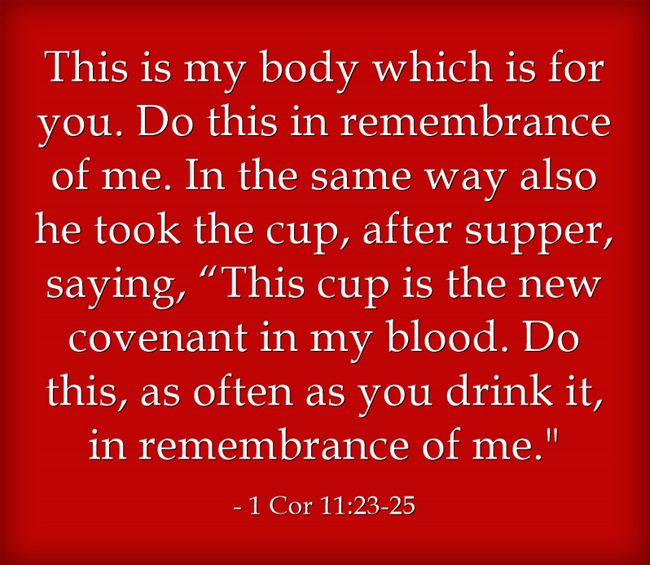Should churches use wine or grape juice for Communion? What do you think?
The Command for Communion
Believers in Christ are commanded to partake in and observe the Lord’s Supper or Communion, as at the Apostle Paul wrote, “For I received from the Lord what I also delivered to you, that the Lord Jesus on the night when he was betrayed took bread, and when he had given thanks, he broke it, and said, “This is my body which is for you. Do this in remembrance of me. In the same way also he took the cup, after supper, saying, “This cup is the new covenant in my blood. Do this, as often as you drink it, in remembrance of me” (1st Cor 11:23-25). The reason Communion is given and we partake in it is just as Paul wrote; “For as often as you eat this bread and drink the cup, you proclaim the Lord’s death until he comes” (1st Cor 11:26). This means that we are not given an option. It is command and by our observance of Communion, we are actually proclaiming Jesus coming. This isn’t just Paul’s command but Jesus Himself says to us, “This is my body, which is given for you. Do this in remembrance of me” (Luke 22:19), not “if you think its right” or “if you feel like it.” The command form or structure of this sentence is “Do this” and is an imperative command. We know we must partake in the Lord’s Supper or Communion. It is commanded.
Self-Examination
The Apostle Paul was clearly angry with the way that the Corinthian church was observing Passover or the Communion meal as he wrote, “When you come together, it is not the Lord’s supper that you eat. For in eating, each one goes ahead with his own meal. One goes hungry, another gets drunk. What! Do you not have houses to eat and drink in? Or do you despise the church of God and humiliate those who have nothing? What shall I say to you? Shall I commend you in this? No, I will not” (1st Cor 11:20-22). The Corinthians had turned the love feast into a drunken party. There is no other way to put it, therefore Paul gave a serious warning about the implications by writing that “Whoever, therefore, eats the bread or drinks the cup of the Lord in an unworthy manner will be guilty concerning the body and blood of the Lord” (1st Cor 11:27). They should have first examined their hearts, confessed any unconfessed sin, and sought to reconcile any broken relationships before partaking in Communion. If it’s done lightly or without introspection, they could possibly drink it to their damnation.
Wine or Grape Juice?
I believe grape juice is best at Communion because there may be some who are former alcoholics who shouldn’t be exposed to any alcohol at all. There are others who are on medication where alcohol could create physical complications, but then there is the fact that today’s wine is stronger than that which the apostles had in their day. Bible scholars believe it was closer to grape juice than fermented wine and they drank it because clean water was not easily accessible to them in that day and a touch of wine would possibly rid the water of any dangerous toxins. Anyway, the alcoholic context was very low compared to today and so low in fact that it probably had little or no effect on those who drank it. Besides, the wine that’s partaken in Communion is in such a small amount that any alcohol content wouldn’t have even have been felt. Overall, I believe it is best to use grape juice and not alcoholic wine because it just doesn’t seem right to be drinking alcohol in the house where God places His name.
Alternatives
Since some must abstain from alcohol, there is simply no reason that grape juice cannot be used because Jesus’ blood is not represented by alcohol but by the shedding of His blood so that we might be saved, rather it is the fruit of the vine that Jesus’ blood is symbolized by. Grape juice can just as easily be used in place of wine and since it’s not real blood but the symbol of the New Covenant in the wine, it doesn’t matter what we drink because the focus is on Jesus’ broken body and His shed blood in which we find the significance of Communion. It is not in the elements of communion themselves (wine and bread) but in the establishment of a new and better covenant made possible by Jesus’ life given for our sakes. Paul stated that it was because of the Corinthian’s unholy partaking of Communion that he says “many of you are weak and ill, and some have died” (1st Cor 11:30). That sounds dead serious, doesn’t it?
Conclusion
Paul’s conclusion about Communion to the Corinthians (and to us) is “So then, my brothers, when you come together to eat, wait for one another— if anyone is hungry, let him eat at home—so that when you come together it will not be for judgment. About the other things I will give directions when I come” (1st Cor 11:33-34). I hope you can see that there is nothing wrong with using grape juice for Communion. It’s just a symbol of the precious blood of the Lamb of God but we still must consider these elements and not partake in the irreverently.
Article by Jack Wellman
Jack Wellman is Pastor of the Mulvane Brethren Church in Mulvane Kansas. Jack is also the Senior Writer at What Christians Want To Know whose mission is to equip, encourage, and energize Christians and to address questions about the believer’s daily walk with God and the Bible. You can follow Jack on Google Plus or check out his book Teaching Children the Gospel available on Amazon.












